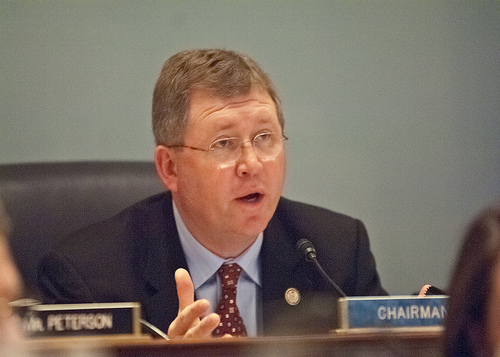
Agricultural News
Chairman Lucas Addresses Implementation of SNAP Work Pilot Project
Wed, 17 Sep 2014 14:20:34 CDT
 Good morning.
Good morning.
Today we are here to discuss the implementation of the Supplemental Nutrition Assistance Program (SNAP) work pilots that are a part of the Agricultural Act of 2014.
We appreciate the participation of Secretary Vilsack who is with us to discuss these efforts to date.
We can all agree on one thing: we want a healthy economy where Americans are working and earning a sustainable wage to support their families. Short of that ideal, we want to help Americans get back to work.
In the period between the 2008 and the 2014 farm bills, we saw our economy experience a significant recession. We watched as our nation's safety net was pushed to extremes, reaching record levels across a number of government programs, including SNAP. Today, we are still experiencing what some have described as the "worst recovery ever" because in no other recession did it take this long to recover lost jobs.
Some progress has been made; the unemployment rate is down from its peak of 10 percent in October 2009 to the most recent report of 6.1 percent. However, we have only seen a small decrease in the number of SNAP participants. We know that many families on SNAP are working, but there are others who have not been able to find employment or earn enough to no longer require federal food assistance.
The work pilots we will be talking about today are a response to that need, incorporating multiple provisions initially contained in the House-passed farm bill.
The Agricultural Act provides up to ten states, with up to $200 million, to operate pilot projects designed to help SNAP recipients prepare for and go to work. The law explains that the approved pilot projects must cover a range of geographic areas, include a mix of voluntary and mandatory participation, and include an assortment of methods designed to promote work.
The point of the pilots covering a range of strategies, each with a rigorous evaluation, is to ensure Congress has the necessary information to make informed decisions about how to help SNAP recipients in the future. For example, through experimentation in cash welfare, we have learned of the success of "work first" programs. These programs are designed to get individuals into work as soon as possible and then offer additional training so they can improve their earnings. We expect these sorts of proven "work first" programs to be among the pilot projects that are approved.
On August 25th, USDA released the Request for Applications and Request for Proposals for the SNAP work pilots setting into motion the next phase of implementation. I am pleased that the Department has done significant outreach to states. I look forward to hearing more about USDA's efforts to meet the requirements of the legislation.
Again, I appreciate the Secretary being here today to provide clarification and additional information on the work they have done and will continue to do as these pilots operate over the next three years.
I will now yield to Ranking Member Peterson for any remarks he may have.
WebReadyTM Powered by WireReady® NSI
Top Agricultural News
More Headlines...



















